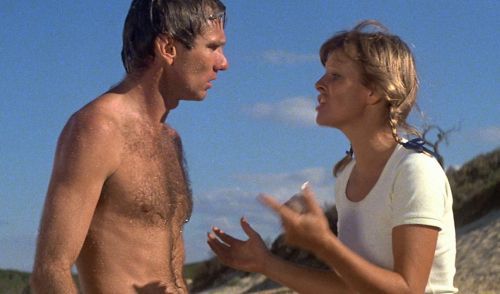Cast: John Hargreaves, Briony Behets, and Mike
McEwen
Director: Colin Eggleston
95 minutes (15) 1978
Second Sight Blu-ray region B
Rating: 8/10
Review by Richard Bowden
One
of a cycle of similarly themed films that came out of Australia in the 1970s,
but perhaps the least well known of any of them, Long Weekend is a tale of enigmatic, lurking environmental threat
made manifest. Like Peter Weir’s Picnic
At Hanging Rock (1975), and The Last
Wave (1970), as well as being related to Nicolas Roeg’s Walkabout (1971), it’s a work which
steadily relates landscape to the faceless presence of elemental forces bound
up in nature, especially those ready to snatch at humankind. And like Hitchcock’s
related The Birds (1963), with which
it shares its serious tone, it has the intelligence to leave humans to draw
their own conclusions as to what went wrong.
It’s
also director Colin Eggleston’s first, and best film. Eggleston, who also made
films of such different quality as Fantasm
Comes Again (1977), and Outback
Vampires (1987) - this last admittedly admired by Tarantino - served out
his apprenticeship in television, a training which paid dividends when he was
able to first spread his wings in using the Panavision process in Long Weekend, but also enabled the
director to work wonders with a still modest budget. Aided by an excellent
script by Everett de Roche, who was also responsible for Razorback (1984), another film where nature’s representative wrecks
havoc on people, the present film is a prime example of the ‘they don’t make
anymore’ variety, being distinguished by subtlety, atmosphere and a mounting
terror which the modern, CGI-laden Hollywood horror product usually only dreams
of.
Long Weekend consists
principally of the fraught interaction between just two characters, Peter (John
Hargreaves) and Marcia (Briony Behets). For the first part of the film there is
some doubt of the source of their marital friction, a masterstroke of scripting
which considerably adds to the growing unease. Instead, their unspecified
frustrations and alienation are externalised, in a process that starts when the
husband accidentally runs over a kangaroo, as between them the couple smash
eggs, hack at trees, shoot off a gun wildly, and kill a dugong. Marcia wants to
return to the comfort of a hotel; Peter does not. Eventually, we discover or
deduce the real reasons for their recriminations, but by then a third, more
ominous character has entered the drama: that of Nature, who apparently has
little time for the self-centred couple so unkindly intruding into her realm.
It’s
clear, however, that not everything can be explained even by the end of the
film, and indeed one of its strengths is that Long Weekend ultimately refuses, or needs, to explain its mystery.
Instead the spectacle of a couple tearing their relationship apart is mirrored
by their increasingly aggressive surroundings, as if Nature itself has little
patience with their attitudes, either towards each other or their environment -
a condemnation of selfishness on a public and private level which seems ever
more relevant and modern today in these times. “Spare me the grotty symbolism,”
says the wife at one point; but it’s clear that is exactly what, on one level,
the couple are: symbols either of an unwelcome intrusion into a natural
landscape or of a modern, spiritual ugliness which has no welcome amongst the
old. Thus nature’s attacks can be seen as punishment for the couple’s repeated
and unthinking transgressions against its fabric, and the unforgiving
landscape, elemental, and unhelpful, read as a metaphor for the childless
relationship they now endure. But unlike The
Birds, there is no feeling that Nature is turning against all of mankind,
merely these two, who treat their surroundings with as much care as they do
their relationship.
All
of this is helped immeasurably by the cinematography, which, despite the film’s
low budget origins, is often breathtaking in its depiction of the lurking and
elemental. Whether following through the crowded bush threatening the couple,
recording the assorted creature attacks, or merely revealing the misty,
primeval sunrises that start their eventful days, Vincent Monton's camerawork
(apparently at times he used a prototype ‘steadicam’) is a model of restraint,
never forcing the pace, merely mounting suspense further without undue
pyrotechnics. Add to this an award-worthy soundtrack, which subtly amplifies
the threatening groans and rustles of surrounding nature into an ambience of
unspoken threat, and you have a film which succeeds often through its sheer
intelligence and design. In some ways this reminds one of the early work of
John Carpenter, where one looks for threat from within the carefully arranged
frame rather from outside it, and where the camera’s unhurried gaze at trapped
characters is its own arbiter of terror.
That’s
not to say that there are no moments of shock. While largely eschewing horrific
set-pieces, Eggleston and de Roche do build in a couple of memorable shock
moments such as the fate of the rival campers, while the dugong (a harmless
black sea cow, shot as a threat by Peter) apparently making its tortured way,
unseen, back up the shore line is truly the stuff of nightmares, and the one
that most people remember most about the film.
Blu-ray
special edition extras:
- Audio commentary with executive producer Richard Brennan and cinematographer Vincent Monton
- Nature Found Them Guilty: examining Long Weekend, a panel discussion with film historians Lee Gambin, Alexandra Heller-Nicholas, Emma Westwood, and Sally Christie
- Extensive stills gallery, accompanied by audio interview with actor John Hargreaves
- Original theatrical trailer





No comments:
Post a Comment